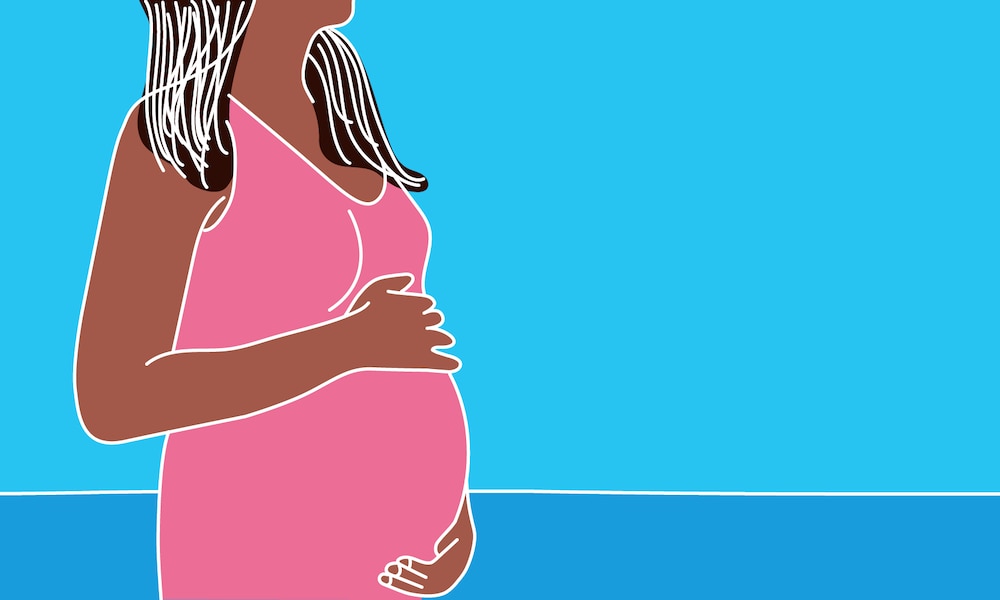Pregnancy and your period – how does it work?

Periods are Mother Nature’s way of saying our bodies are ready for having babies. But what happens to them once you are pregnant? We’ll give you the basics to understand the relationship between your period and pregnancy.
Whether you’d celebrate being able to wave your period goodbye for nine months or would actually miss it, giving your monthly flow a break is a natural part of being pregnant – so much so, that it’s one of the first signs you’ll soon become a parent!
Pregnancy brings about many different experiences; for starters there’ll be a new life growing inside you, not to mention your body will change too, and this includes your menstrual cycle. Let’s take a closer look at not only how pregnancy affects your period but also how your period can affect pregnancy, so that you can be prepared for when and if the time comes.
Can you get pregnant on your period?
Technically, yes! You can get pregnant at pretty much any time of your menstrual cycle and this includes when you’re on your actual period. And while the chances may be lower, sperm can actually live in your body for up to five days – so just because your womb may be busy with your flow, it doesn’t mean there might not be room for a baby too! [1] Basically, if you have unprotected sex on your period and your next one is late, you may want to take a pregnancy test.
Even though you can get pregnant when you are on your period, the success rate is not as high compared to other points during your cycle. This means that if you are trying to become a parent, you’ll increase your chances by having unprotected sex during ovulation instead (when an egg is released from your ovaries). If you aren’t sure when this is, a rough estimate is during the 11th and 21st day of your cycle.
Will your periods completely disappear when you’re pregnant?
In a nutshell, yes. Your monthly flow will take a little holiday during your pregnancy and not show up until after the birth – and even then it may take a while for your postpartum period to kick in. The reason you don’t get your period when you’re pregnant is because the womb keeps its lining to create a nice home for the baby growing inside of you. Had that sperm not fertilised your egg, this lining would have been shed through your vagina as blood – aka your period!
Brown spotting during early pregnancy
Even though you won’t have periods during pregnancy, you may experience something similar at the beginning, known as implantation spotting.
Implantation usually happens around 6-12 days after you’ve had unprotected sex and is the process of a fertilised egg attaching itself to the uterus lining. [2] When your body goes through this, tiny blood vessels in the uterus wall can break down and trigger a very light and short flow that appears as small spots in your underwear – this is why it’s often referred to as “spotting”.
So even though this process still involves some blood being shed through the vagina, it is not caused by hormones like menstruation is. You may also notice that the blood colour is slightly different from your regular periods: usually rusty brown or even light pink.
What if I experience more spotting while pregnant?
Any spotting other than implantation spotting at the beginning of your pregnancy should be checked out by your doctor or gynaecologist, as it could signal an issue. While not all blood drops in your pants mean there’s a problem, it’s always best to be on the safe side. Given that pregnancy in general can be an overwhelming time, no concern (no matter how little or silly it might seem) is too small to contact a health professional – even if it just helps putting your mind at ease!
If you want to continue learning about all the changes that come with pregnancy, check out our articles on how does your vagina change after giving birth and postpartum discharge.
Medical disclaimer
The medical information in this article is provided as an information resource only, and is not to be used or relied on for any diagnostic or treatment purposes. Please consult your doctor for guidance about a specific medical condition.
[1] https://www.mayoclinic.org/healthy-lifestyle/getting-pregnant/expert-answers/pregnancy/faq-20058504



